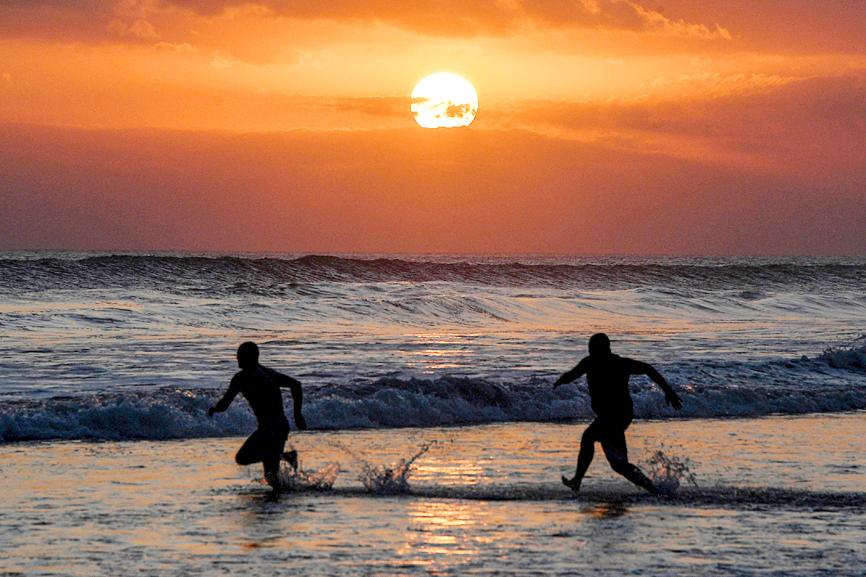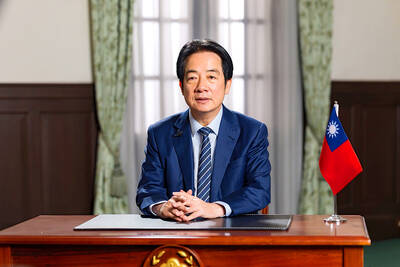In the new world of work, there’s a new type of employee: The business-leisure traveler.
It’s the latest attempt to find a happy medium between working arrangements like Airbnb’s — where staff can work anywhere, anytime — and those at companies like Tesla Inc, whose chief executive officer Elon Musk tweeted that unless employees turn up in the office, “we will assume you have resigned.”
Business-leisure travelers are a subset of digital nomads, living and working abroad for longer than a typical holiday without taking up permanent residence. They usually spend weeks or months overseas before returning home, while other nomads may spend years on the road.

Photo: AFP
David Abraham realized there was a market for this type of ultra-remote working while at his laptop in a Tokyo Starbucks. When he noticed the customers around him were working too, he asked himself “why couldn’t they be in an amazing place like Bali?”
Abraham now runs Outpost, a company that provides temporary living-working spaces in Indonesia and Sri Lanka.
Employees’ growing enthusiasm for business-leisure travel is slowly being met with policy momentum. Governments are trying to work out visa and tax regulations while businesses fret about compliance and corporate culture.

Photo: Bloomberg
Officials in tourism hotspots Thailand and Indonesia see the longer-term travel trend working in their favor — if everyone can get the rules right.
On the Indonesian island of Bukabuka, a four-hour-plus journey by airplane and boat from the capital city of Jakarta, eco resort Reconnect is seeing a surge in inquiries from foreigners. Now that borders have reopened, overseas visitors with plans to work remotely are booking sojourns of anywhere between a month and half a year.
The resort features large communal spaces and work stations, ready to accommodate the new cohort of business-leisure travelers. Most days, the Internet is stable enough too.
“But the main selling point is really the island itself,” said Reconnect founder Thomas Despin. Between Zoom meetings, guests can go snorkeling, learn the local art of spearfishing and even enjoy a barbecue in the middle of the sea.
There is one drawback: “Potential guests ask us, how legal is it for me to come and stay and work?” Despin said. “At the moment, we don’t have a specific answer.”
Under Indonesian law, anyone who stays in the country for 183 days in a 12-month period is legally considered a tax resident. But paying taxes requires a work permit commonly referred to as a KITAS, which isn’t available to those traveling on a tourist visa. That leaves some would-be business-leisure travelers in a legal gray area.
In April last year, Indonesia floated the idea of a special five-year visa exempting remote workers from paying local taxes if they don’t earn an income domestically. But there’s no timeline as yet.
“You don’t want to just be hoping for the best when it comes to your visa status,” said Despin. “You want to know what the rules are.” Colleagues of his have left Indonesia for Mexico, Portugal and neighboring Thailand, where immigration and tax laws are more supportive and clearer.
Since 2019, more than two dozen countries have introduced “digital nomad” schemes that allow people to live and work remotely for a period of months or even years, according to Migration Policy Institute analyst Kate Hooper, who analyzed data from law firm Fragomen.
Thailand began experimenting early in the pandemic with programs designed to attract longer-term travelers, such as golf-course quarantines and “sandbox” arrangements. The country got about one-fifth of its economic juice from tourism before COVID-19 arrived.
Now, in the spirit of targeting more digital nomads and business-leisure travelers, the government has approved tax incentives for long-term visa holders and will lift all remaining COVID-related entry restrictions from July 1.
The country has several plus points for longer-term visitors who also plan to work, according to tourism minister Phipat Ratchakitprakarn.
“The Internet in Bangkok and in many big cities is fast,” he said, while Thailand also offers “service and atmosphere” and a relatively low cost of living.
And, he added, “we don’t tax digital nomads. Their income is generated overseas.”
The next round of tax changes can’t come soon enough for the country’s still-struggling hospitality industry.
“I am sure we can compete in terms of fundamentals but the problem is policy implementation,” said Bhummikitti Ruktaengam, president of the Phuket Tourist Association. He argues that a simple visa application process is needed to attract working travelers.
“They won’t come if they need to fill up a pile of paperwork,” he said.
Longer-term visitors may bring economic benefits, but they can also create problems for the local population, a Migration Policy Institute report points out. Wealthy visitors bring with them rising costs of living, increasing competition for resources and associated tensions “as evidenced in existing hotspots such as Goa and Bali.”
While governments face a hefty set of challenges in marrying a tourism revival with ease of doing business, companies have their own list of concerns.
At established firms, chief financial officers often have little appetite for Airbnb-style worker freedom because of tax issues and other liabilities, according to Simon Hayes, director of the Asia CFO Network.
Yet many business leaders are accepting what their human resources departments already know: Most employers will be forced to keep up with the times.
Business-leisure travelers aside, tight labor markets around the world are giving workers the power to demand more flexibility. Over the next three to six months, Hayes expects more companies to set up remote-work options for those employees who are trusted to get their jobs done on the beach or elsewhere.
There’s a clear willingness to at least consider looser policies around remote work, according to an Asia CFO Network survey of 31 multinational companies across the Asia-Pacific region. But there are also significant concerns, with tax issues and “corporate culture dilution” at the top of the list.
“One issue is navigating the tax, social security and employment and labor provisions of both countries to ensure compliance in both locations,” said MPI’s Hooper. Another is the risk of triggering permanent establishment rules that may incur corporate tax obligations, she said.
While business-leisure travel isn’t about to overtake other types of travel, it’s still an opportunity for tourism-heavy economies.
“It’s a growing segment but will remain a ‘niche’ segment,” said Margaux Constantin, a partner at McKinsey & Co who leads the firm’s work in tourism. The potential for high spending on longer-than-average trips makes business-leisure travelers an attractive market, she said.
“It’s not surprising to see that some destinations are actively prioritizing this segment as part of their tourism strategy.”

This month the government ordered a one-year block of Xiaohongshu (小紅書) or Rednote, a Chinese social media platform with more than 3 million users in Taiwan. The government pointed to widespread fraud activity on the platform, along with cybersecurity failures. Officials said that they had reached out to the company and asked it to change. However, they received no response. The pro-China parties, the Chinese Nationalist Party (KMT) and Taiwan People’s Party (TPP), immediately swung into action, denouncing the ban as an attack on free speech. This “free speech” claim was then echoed by the People’s Republic of China (PRC),

Most heroes are remembered for the battles they fought. Taiwan’s Black Bat Squadron is remembered for flying into Chinese airspace 838 times between 1953 and 1967, and for the 148 men whose sacrifice bought the intelligence that kept Taiwan secure. Two-thirds of the squadron died carrying out missions most people wouldn’t learn about for another 40 years. The squadron lost 15 aircraft and 148 crew members over those 14 years, making it the deadliest unit in Taiwan’s military history by casualty rate. They flew at night, often at low altitudes, straight into some of the most heavily defended airspace in Asia.

Many people in Taiwan first learned about universal basic income (UBI) — the idea that the government should provide regular, no-strings-attached payments to each citizen — in 2019. While seeking the Democratic nomination for the 2020 US presidential election, Andrew Yang, a politician of Taiwanese descent, said that, if elected, he’d institute a UBI of US$1,000 per month to “get the economic boot off of people’s throats, allowing them to lift their heads up, breathe, and get excited for the future.” His campaign petered out, but the concept of UBI hasn’t gone away. Throughout the industrialized world, there are fears that

The Democratic Progressive Party (DPP) controlled Executive Yuan (often called the Cabinet) finally fired back at the opposition-controlled Legislative Yuan in their ongoing struggle for control. The opposition Chinese Nationalist Party (KMT) and Taiwan People’s Party (TPP) acted surprised and outraged, but they should have seen it coming. Taiwan is now in a full-blown constitutional crisis. There are still peaceful ways out of this conflict, but with the KMT and TPP leadership in the hands of hardliners and the DPP having lost all patience, there is an alarming chance things could spiral out of control, threatening Taiwan’s democracy. This is no